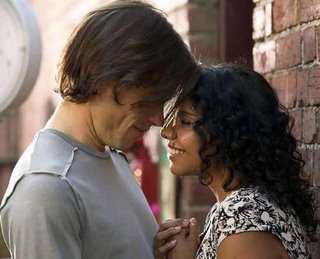Book of Revelations
Going in to the Nova to buy my ticket for this movie (it was a special preview with a Q & A session, so I thought I should buy in advance) I was told that Tom Long, the star, was actually watching a movie at the time, so there was a chance for a bit of celebrity spotting. I looked, but the only person I recognised was the old bearded guy who relentlessly asked me for money any time I went past. As it turned out, I wouldn't have recognised Tom Long anyway: my memory of the sweet Angus of Seachange would have been no help at all. Tom Long now has quite a magnificent beard of his own, and his eyes are those of someone quite driven.
 The story of the movie is quite simple. Daniel is a dancer, one with a splendid body, full of odd sinews and curves. Being a dancer, it is frequently on display. Three women decide to abduct him, simply because he is beautiful, and to act out their fantasies - mostly sexual, but one's instincts are much more of a mothering nature. Some of these scenes are quite explicit: Daniel spends his times chained down, available to the women to do what they will with him. One thing they do want is to see him dance, just for them: he manages a completely dispirited performance, one that was called the "broken dance" in the Q & A. They keep him for 12 days, and then throw him back. An interesting feature of the Q & A session afterwards was the way in which some in the audience wanted to make it about the women in it. Director Anna Kokkinos was very clear that she was interested in the role reversal, in making a male the helpless one, the one on whom women project their fantasies, although she does concede that men might learn something of women's learned helplessness from this movie.
The story of the movie is quite simple. Daniel is a dancer, one with a splendid body, full of odd sinews and curves. Being a dancer, it is frequently on display. Three women decide to abduct him, simply because he is beautiful, and to act out their fantasies - mostly sexual, but one's instincts are much more of a mothering nature. Some of these scenes are quite explicit: Daniel spends his times chained down, available to the women to do what they will with him. One thing they do want is to see him dance, just for them: he manages a completely dispirited performance, one that was called the "broken dance" in the Q & A. They keep him for 12 days, and then throw him back. An interesting feature of the Q & A session afterwards was the way in which some in the audience wanted to make it about the women in it. Director Anna Kokkinos was very clear that she was interested in the role reversal, in making a male the helpless one, the one on whom women project their fantasies, although she does concede that men might learn something of women's learned helplessness from this movie.
There is also some commentary on the commonly held view that men always want sex, so it is impossible to rape them: this is most clearly brought out when Daniel tries to report the crime of being abducted by 3 women. The two policemen evidently think that this would be their idea of paradise and fail to take him seriously. We see enough of Daniel to know that there is no way he enjoys any aspect of his incarceration, even if his body does respond to some of the ministrations of the women.
But a far greater part of the movie was about inability to communicate, and the gradual gaining of the ability to be revelatory (hence the title) with the rather obvious point being made that it is through communication, we reveal our humanity. I was initially a bit pissed off, as I thought that while the movie was breaking interesting ground, it was nonetheless buying into a familiar stereotype by having Daniel totally unable to say anything about his experiences. But it was pointed out in the Q & A that his two closest companions are two very uncommunicative women: we never get much of a sense of who Bridget, his girlfriend is, save that she's too lazy to get her own cigarettes - it is her request that Daniel get some for her that puts him out on the street to be abducted. (This leads to a suggestion that she is complicit in his abduction as, in an economy of casting, the same actress plays Bridget and one of the masked women who kidnaps him. There is, however, no connection between the two characters.) We can tell both from their apartment and the way they dance together that there is not much to their relationship: the apartment looks like a picture in a home furnishing catalogue and the dance is purely erotic. The other woman, Isabel (Greta Schacchi), is the director of the dance he is performing and remains focussed on the production.
When he is released, he can't say anything to either of what has happened, can't dance, can't be with any part of his past life. He tries to pretend nothing happens, but then he has encounters with women which become increasingly violent, as he acts out his anger at what happened.

It is only when he's randomly asked one day on a train if he is alright, that this process slows down. Since all he knows about the three women who abducted him was that they were white, he could know immediately that Julie (Deborah Mailman) was not involved - which enables a gradual rebuilding of trust. He still can't talk, but he can finally renew his connections with Isobel and, eventually, express himself through dancing.

The final scenes are a further step to rehabilitation: one of his violent outbursts gets him arrested, but by now he can finally call on someone to help him in his troubles. You can probabkly guess it is Julie, but it is not her who comes to his aid; instead, it is the one person we meet in the movie who has the kind of professional expertise and male mana to be able to take our Dan in his arms and say "Now, start at the beginning."
Yes, there are complaints about the somewhat wooden acting of Anna Torv (Bridget) and indeed of Tom Long, but these complaints seem to miss the point that they were deliberately wooden, that for Daniel at least, this was to be a revelatory experience. I think that once we see him in his cell and then afterwards, no-one could describe his performance as wooden. The fact that he creates this character so far removed from young Angus, who lived for surfing, is testament to the fine job of acting he does.
I don't remember any laughs in the movie, but there was certainly one after. Tom Long walked out beside me: as we approached the exit, two old dears, who obviously have known him a fair old while, had a certain amount of difficulty dealing with him, after spending the last couple of hours watching him in this movie.


2 Comments:
Have you read the book, by Rupert Thomson? It's one of my favourites. I had no idea there was a film.
I haven't read it yet, but it is sitting in a pile: I really do want to get to it, but that is true of so many other books!
Post a Comment
Subscribe to Post Comments [Atom]
<< Home